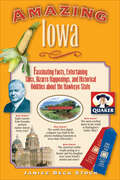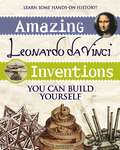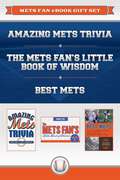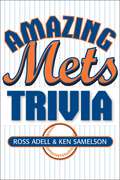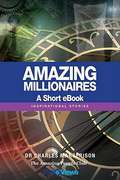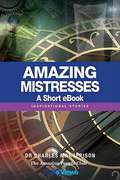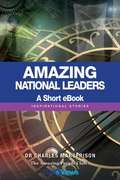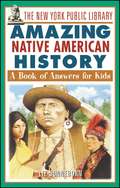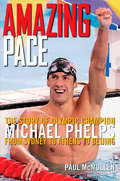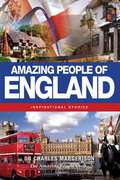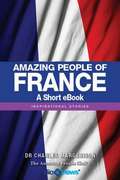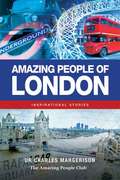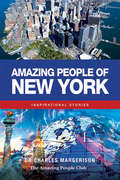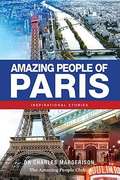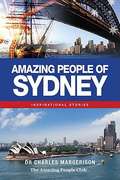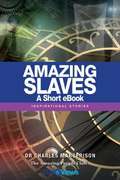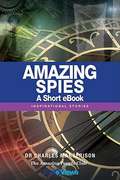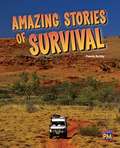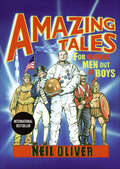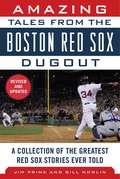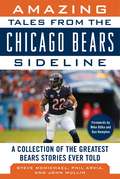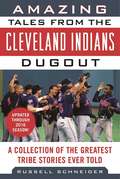- Table View
- List View
Amazing Iowa
by Janice Beck StockDiscover another side of the Hawkeye State with this illustrated volume of fascinating facts, historical oddities, curious tales, and more.Amazing Iowa offers a rare glimpse into the unusual events and peculiar people hiding within the pages of Iowa’s history. Inside you’ll learn about everything from Jesse James’s first train robbery to the longest beard known to man, not to mention the secret behind the world’s best Iowa pork chop marinade. With stories, trivia, photographs, recipes, song lyrics and more, this volume is a treasure trove of Iowa curios. Within these pages, you’ll find:Eddie Rickenbacker, who raced cars with a bat’s heart tied to his middle finger.Lyrics of the “Iowa Corn Song”.Heroes of the past (TV’s first Superman was born in Iowa).Heroes of the future (Captain James T. Kirk will be born in Iowa).Ellen Church of Cresco, the first airline stewardess in the country.
Amazing Leonardo da Vinci Inventions
by Maxine AndersonAmazing Leonardo da Vinci Inventions You Can Build Yourself introduces readers to the life, world, and incredible mind of Leonardo da Vinci through hands-on building projects that explore his invention ideas. Most of Leonardo's inventions were never made in his lifetime-they remained sketches in his famous notebooks. Amazing Leonardo da Vinci Inventions You Can Build Yourself shows you how to bring these ideas to life using common household supplies. Detailed step-by-step instructions, diagrams, and templates for creating each project combine with historical facts and anecdotes, biographies and trivia about the real-life models for each project. Together they give kids a first-hand look intothe amazing mind of one the world's greatest inventors.
Amazing Mets Fan eBook Gift Set
by Taylor Trade PublishingMatt Harvey is getting healthy. The young pitching staff looks ready from prime time. Even Mr. Met is holding his head a little higher these days. This eBook Gift Set is the just the thing every Mets fan needs. Each book highlights only the best of the Mets throughout baseball history. This set includes Amazing Mets Trivia, Mets Fan's Little Book of Wisdom, and Best Mets. From trivia to tips and best-kept secrets, these books are fast paced and exciting (even when the team wasn't).
Amazing Mets Trivia
by Ken Samelson Ross AdellBorn out of expansion in 1962, the New York Mets have more than filled the void left by the departure of the Brooklyn Dodgers and New York Giants. They have provided baseball fans in New York and around the baseball world with close to 40 years of memories including Casey Stengel's loveable losers, the improbable 1969 miracle, another world championship in 1986 and National League pennants in 1973 and 2000 with many unforgettable moments in between. Amazing Mets Trivia tests the memories of Met fans of all ages with hundreds of questions and facts about players including: Tom Seaver, Cleon Jones, Willie Mays, Rusty Staub, Dave Kingman, Lee Mazzili, Darryl Strawberry, Doc Gooden, Keith Hernandez, Gary Carter, Mike Piazza, Edgardo Alfonzo, John Franco and many others.
Amazing Millionaires - A Short eBook
by Charles MargerisonYou may know the names of famous millionaires and wonder how they struck it rich. This unique collection of short audio stories from The Amazing People Club tells their tales. It explores the lives of four amazing millionaires and follows them on their amazing journeys to fame and fortune. Meet Cesar Ritz, the man behind the term 'Ritzy', whose life was just that. He came to be known as the 'king of hoteliers, and hotelier to kings'. Also, meet the man behind the Nobel Prizes. Alfred Nobel's life, often shrouded in mystery, comes to life through his BioViews® as we explore his career as a chemist, engineer, innovator, and armaments manufacturer. Unknown to many people, he actually invented dynamite! Meet Howard Hughes - aviator, engineer, industrialist, film producer, film director and philanthropist who became who became one of the wealthiest people in the world. Another fascinating character is Henry Wellcome. He may have saved your life with the medicines he produced. The Wellcome Trust is one of the largest medical charities in the world. Each story is unique and amazing and could perhaps be just what you need for inspiration to achieve your own ambitions. Each story comes to life through BioViews®. These are short biographical narratives, similar to interviews. They provide an easy way of learning about amazing people who made major contributions and changed our world.
Amazing Mistresses - A short eBook
by Charles Margerisonratives, similar to interviews. They provide an easy way of learning about amazing people who made major contributions and changed our world.
Amazing National Leaders - A Short eBook
by Charles MargerisonWhat are the qualities needed for good, effective leadership? What are the characteristics that makes some people natural leaders? Are great leaders born or made? All of these questions and more are answered in this unique collection of eStories, as amazing national leaders from history guide us through their incredible lives. Learn about their strengths and weaknesses, triumphs and failures.Exploring Catherine the Great's revitalization of Russia, Ghandi's successful non-violence agenda, Napoleon's great victories and devastating defeats, Queen Elizabeth I's Golden Age and George Washington's election as the first President of the United States, we can learn so much from them and be inspired by each and every one.The Amazing National Leaders stories come to life through BioViews® which are short biographical narratives, similar to interviews. These inspirational stories from The Amazing People Club® provide a new way of learning about amazing people who made major contributions and changed our world.
Amazing Native American History: A Book Of Answers For Kids
by Liz Sonneborn New York Public Library StaffDiscover how a game of lacrosse led to a victory for the Ojibwa tribe against the British, find out why the Menominees are called the wild rice people, and meet some of the great heroes of Native America, from Sequoyah and Sitting Bull to Pocahontas. Enjoy the holidays, foods, dances, and stories of these diverse peoples and find the answers to all your questions about Native American history. . . . Why did the Mound Builders build mounds? See page 14. What was the Trail of Tears? See page 59. Why didn′t Montezuma attack Cortes′ men? See page 27. Who were the Navajo Code Talkers? See page 94. What was the Alcatraz takeover? See page 107. What was the Iroquois confederacy? See page 33. Did all Inuit live in igloos? See page 131. What were the Mayans′ greatest scientific achievements? See page 21.
Amazing Pace: The Story of Olympic Champion Michael Phelps from Sydney to Athens to Beijing
by Paul McmullenA vibrant portrait of American swimmer Michael Phelps—the dominant athlete at the 2004 Olympics—who has relentlessly pushed himself, promoted his sport, and appears poised to ultimately accumulate the most gold medals in Olympic historyBefore he was old enough to have a driver's license, Michael Phelps had a world record. Before he ever took a college class or turned 20, he had earned distinction by winning 8 medals—6 gold and 2 bronze—at the Athens Olympics, the most in non-boycotted Games. Along the way, he captivated an American television audience and confounded the critics who questioned his ambition.Amazing Pace:• provides the most revealing look yet at a young man who became a world-class athlete before he had the chance to grow up—by respected Baltimore Sun journalist Paul McMullen, who followed Phelps's rise from an obscure 14-year-old to the most scrutinized competitor at the world's biggest sporting event• details the plotting of his career, from turning professional at age 16, to the management of the first crises he encountered Paul McMullen's 5 years of observation add dramatic context to the life of a young athlete whose rise to prominence coincided with the tumult of the first Summer Olympics after 9/11. No Olympian has ever earned 10 gold medals in a career, but Michael Phelps is on pace to achieve that milestone at the 2008 Games in Beijing, China.
Amazing People of England
by Charles MargerisonEngland, throughout its history, has been the birthplace of countless inspirational people. Some have become household names around the world. Many more deserve to be, but are as yet unsung heroes. In this unique story collection from The Amazing People Club®, take a journey through the lives of some of England's most amazing people. Meet Ada Lovelace, the world's first computer programmer, from the mid 19th Century! Learn the life events that propelled Shakespeare and Dickens to their literary pinnacles and subsequent fame. Find out how Thomas Newcomen invented the first practical steam engine, and how Francis Crick, the molecular biologist, became the co-founder of the structure of the DNA molecule, thus discovering 'the secret of life'! Join all these amazing people and many more as they tell their own stories through BioViews®. A BioView® is a short biographical story, similar to an interview, about an amazing person. These stories offer an inspirational way of learning about people who made major contributions to our world. The unique format and flow enables each person's story to come alive, as if it is being personally told to you, and reflects their interests, emotions and passions.
Amazing People of France - A Short eBook
by Charles MargerisonIn this unique, inspirational story collection from The Amazing People Club®, meet some of the amazing French people who have made major contributions to a great nation. Meet the unforgettable Louis XIV, who had the vision for one of France's most visited sites - the Palace of Versailles. Discover his personal challenges and relationships, and better understand what motivated him and enabled him to reign France for seventy-two years. Meet Louis Pasteur, an amazing chemist and microbiologist. Many know about the groundbreaking work he did around pasteurisation however few know that among many other things, he created the first vaccines for anthrax and rabies. Meet philosopher, writer, feminist: Simone de Beauvoir who broke free from societal chains and marched to the beat of her own drum. Find out about her relationship with prominent existentialist Jean-Paul Sartre, and learn more about the woman whose intellect and passion made her more than a match for her male counterparts. Discover the little-known story of Louis Bleriot, the french aviator who was the first man to fly over the English Channel. Finally, meet Louis Braille, whose pivotal work changed the lives of blind and visually impaired people around the globe. Celebrate the lives of these amazing French people through BioViews®, which are short biographical narratives that are similar to interviews. These inspirational stories from The Amazing People Club® provide a new way of learning about amazing people who made major contributions and changed our world.
Amazing People of Germany - A Short eBook
by Charles MargerisonGermany is a country rich in history for many reasons, both good and bad. In this exciting title, The Amazing People Club would like to bring you face to face with some of the most influential and inspirational people of Germany. Everyone has heard of Beethoven and his masterpieces, but few know that he sought solace in music due to his sad childhood at the hands of an abusive and alcoholic father. Over 15 million people find pain relief every year using Aspirin; however Felix Hoffmann who discovered this household drug received little public recognition. Explore the turbulent life of Marie-Elisabeth Luders, who worked tirelessly for the rights of women and children in a society that criticised her for being a single mother. Also, meet Gerhard Domagk and Robert Koch and discover how these amazing people devoted their time and energy to developments and innovations that made major contributions to the country of Germany. Each story comes to life through BioViews®. These are short biographical narratives, similar to interviews. They provide an easy way of learning about amazing people who made major contributions and changed our world.
Amazing People of London: Inspirational Stories
by Charles MargerisonAs you walk around historic London, you are traveling in the footsteps of amazing people including Charles Dickens, Florence Nightingale, Charlie Chaplin, Emmeline Pankhurst and Winston Churchill. In their different ways, they made major contributions to London, which in turn helped make the city what it is today. A city tour unlike any other, Amazing People of London takes you on a fascinating journey through the history of one of the world's most celebrated cities. Through BioViews®, you can meet those who contributed to the music, the business, the politics and other vital and fascinating aspects of London. A BioView® is a short biographical story, similar to an interview. These unique stories provide an easy way of learning about amazing people who made major contributions and changed our world.
Amazing People of New York: Inspirational Stories
by Charles MargerisonAs you walk around New York City, you are traveling in the footsteps of amazing people including George Washington, Mark Twain, Sojourner Truth, Irving Berlin, John D. Rockefeller, and Susan B. Anthony. In their different ways, they made major contributions to New York, making the city what it is today. A city tour unlike any other, Amazing People of New York takes you on a fascinating journey through the history of one of the world's most visited cities. You will meet those who contributed to the music, the business, the fight for civil rights, the transport and other vital aspects of the city's life. Come face to face with iconic figures associated with what John Fitzgerald called "The Big Apple" through BioViews. A BioView is a short biographical story, similar to an interview. These unique stories provide an easy way of learning about amazing people who made major contributions and changed our world.
Amazing People of Paris
by Charles MargerisonHave you ever wondered how the Eiffel Tower was built? Or, what it would have been like to wander the streets of Montmartre a hundred years ago and meet people like Edith Piaf and the famous painters? As you walk around the City of Light, you are travelling in the footsteps of amazing people including Napoleon Bonaparte, Voltaire, Victor Hugo, Toulouse-Lautrec and Gustave Eiffel. In different ways, all of these amazing characters made major contributions, making the city of Paris what it is today. A city tour unlike any other, Amazing People of Paris takes you on a fascinating journey with these icons of one of the world's most visited cities. You will meet those who contributed to the music, the art, the architecture, the politics and other vital aspects of the city's life. Come face to face with those who developed the Arc de Triomphe, Notre Dame Cathedral, the Louvre, the Tuilleries Gardens and other great places. Walk around the city with the stories of the people who created the sites we love to visit. What is a BioView®? Your tour of the people and places of Paris comes alive through BioViews®. A BioView® is a short biographical story, similar to an interview. These unique stories provide an easy way of learning about amazing people who made major contributions and changed our world.
Amazing People of Russia - A Short eBook
by Charles MargerisonRussia is the largest country in the world and covers more than one eighth of the globe's inhabited land mass. So, it stands to reason that it has been home to many amazing people. The Amazing People Club takes you on a virtual historical journey into the lives of some of these inspirational contributors to this nation. Famous for her many lovers, Catherine the Great was also a strong leader who inspired loyalty and respect rather than fear and oppression - indeed she did not do things in a traditional manner. Orbit the earth with Yuri Gagarin, the first man in space at the age of 27. Be swept away by the composer of such masterpieces as Swan Lake and The Nutcracker, Tchaikovsky, who led a somewhat troubled life despite achieving immense success. Also, meet Vasili Mitrokhin and Ivan Pavlov. Their stories are monumental and brought to life in this fascinating title. Each story comes to life through BioViews®. These are short biographical narratives, similar to interviews. They provide an easy way of learning about amazing people who made major contributions and changed our world.
Amazing People of Scotland - Volume 1
by Charles MargerisonHome to the Loch Ness monster, kilts, clans and medieval castles, Scotland was also the birthplace of some amazing innovators, who made major contributions to our world. We watch television every day but few of us know that it was invented by a Scottish engineer named John Logie Baird. He also developed colour television and other ways of communicating that have become intrinsic parts of everyday life. Be inspired by the rags to riches story of Andrew Carnegie, an entrepreneurial magnate who amassed riches never seen before. He also unselfishly supported the betterment of the lives of others through his generosity as a great philanthropist. Meet Thomas Telford, the 'Colossus of Roads' who has left an immense legacy in what he designed and built. Discover how James Lind became an outstanding clinician, responsible for saving countless lives to this very day. Be blown away by the life story of James Watt, whose work on the steam engine and other innovations has transformed our world. Each story comes to life through BioViews®. These are short biographical narratives, similar to interviews. They provide an easy way of learning about amazing people who made major contributions and changed our world.
Amazing People of Sydney
by Charles MargerisonImagine you had to sail 10,000 miles to an island in the South Pacific Ocean in an old wooden boat. In 1788, that happened to over 1400 English convicts, colonists, captains and men of the Marine Corps. Watched by fearful local Aboriginals, they established a base in a place called New South Wales, Australia. Who were these amazing people? How did they survive and build the great and beautiful city that we now call Sydney? A city tour unlike any other, Amazing People of Sydney brings you in touch with real people who have left us a legacy that we can explore. Travel through time and meet some of the amazing people who helped Sydney develop. Discover how Governor Arthur Phillip and Bennelong, the captured Aborigine, tried to build relations between the communities. Explore the lives of people including Francis Greenway, Mary Reibey and George Howe. All of them arrived in Sydney as convicts and through their tenacious spirit, grew to become some of the most significant figures in the city. Find out about William Tom's discovery of gold, and Captain Thunderbolt's great escape from Cockatoo Island. Be moved by the outstanding work of the tireless humanitarian, Caroline Chisholm, and her work with young women. Discover how Banjo Paterson wrote Waltzing Matilda. These stories, and many others, come alive through BioViews®. What is a BioView®? A BioView® is a short biographical story, similar to an interview. These unique stories provide an easy way of learning about amazing people who made major contributions and changed our world.
Amazing Slaves - A Short eBook
by Charles MargerisonFrom the horror of slavery incredible strength has been born. A unique collection of short stories from The Amazing People Club® reveals the great strength of character that propelled people to fight for their human rights. Frederick Douglass said that "The soul that is within me no man can degrade". Discover how he escaped from slavery to become the leader of the abolitionist movement, gaining recognition for his dazzling oratory and incisive antislavery writing. Find out about the life of Harriet Tubman, who suffered horrific abuse whilst in slavery, until she escaped and set about rescuing more than 70 slaves using a antislavery activist network known as the Underground Railroad. Meet Sojourner Truth as she tells you about how being born into slavery moulded her into a powerful abolitionist who was brave enough to speak out against slavery and for women's rights. Did you know that Sojourner Truth could not read or write but still managed to produce and sell her autobiography? Find out why she changed her name to Sojourner Truth once New York State abolished slavery, and how she pledged to "travel up and down the land" in her quest to support women's and black people's rights. The equally inspirational stories of Zumbi Dos Palmares, who played a pivotal role in Brazilian history and Sally Hemmings, who was born into slavery and became Thomas Jefferson's mistress are also featured. Celebrate the lives of these amazing people through BioViews®, which are short biographical narratives that are similar to interviews. These inspirational stories from The Amazing People Club® provide a new way of learning about amazing people who made major contributions and changed our world.
Amazing Spies - A Short eBook
by Charles MargerisonWelcome to the secret world of spies. For obvious reasons, their lives are often shrouded in mystery however in this unique collection of short audio stories, you'll come 'face-to-face' with some of the world's most amazing spies, as their unique stories come to life. Meet the Russian spy who risked everything to share intelligence after being shocked at how the KGB were oppressinghis fellow Russians. Explore the fascinating and little-known story of Maria Poliakova, a daring young woman who played a key role in Hitler's ultimate downfall. Delve into the unbelievable life of Sidney Reilly who was the real-life inspiration for Ian Fleming's fictional character James Bond. Travel with Klaus Fuchs, a spy who leaked crucial nuclear bomb information from the USA, UK and Canada to the USSR. Each story comes to life through BioViews®. These are short biographical narratives, similar to interviews. They provide an easy way of learning about amazing people who made major contributions and changed our world.
Amazing Tales for Making Men Out of Boys
by Neil OliverStories of heroism, exploration, and sacrifice -- including Apollo XIII and Scott of the Antarctic -- that inspire boys to be courageous, selfless, and open to adventureTales of brave and selfless deeds used to be part of every boy&’s education. We grew up sharing stories with our fathers, uncles, and grandfathers of how other men had lived their lives, met their challenges, reached their goals, and faced their deaths. Becoming a man was about comradeship and standing by your friends whatever the circumstances. And it meant that sometimes it was more important to die a hero than live a coward&’s life. Through Neil Oliver&’s vivid, stirring accounts we can rediscover the stories that inspire men to perform acts greater than themselves. These are the epics that we should all know by heart; the tales of courage, endurance, and sacrifice that made men out of boys.Amazing Tales for Making Men Out of Boys is packed with classic stories of courage and heroism from around the world and includes four stories especially for the American edition: Omaha Beach, June 6th 1944; The Alamo; The Civil War Battle of Shilo; and The Revolutionary War Sea Battle of John Paul Jones and the Bon Homme Richard.
Amazing Tales from the Boston Red Sox Dugout: A Collection of the Greatest Red Sox Stories Ever Told (Tales From The Team Ser.)
by Jim Prime Bill NowlinCalling all BoSox fans! In this one-of-a-kind compendium of anecdotes from players, managers, and beat writers, Jim Prime and Bill Nowlin capture all the magic and passion of Boston Red Sox baseball. Amazing Tales from the Boston Red Sox Dugout is a colorful journey through the history of the franchise. Included are the best memories and stories in the players’ and managers’ own words, as found in Prime and Nowlin’s Tales from the Boston Red Sox Dugout and More Tales from the Boston Red Sox Dugout.Within these pages, fans will chafe at the rivalries, cheer the wins, and challenge the losses both on the road and at home. From the earliest days of a promising young pitcher named Babe Ruth, through the glory years of Foxx, Williams, and Yastrzemiski, to the championship era of superstars such as Martinez and Ortiz, the Red Sox epitomize all that is grand about the grand old game. Featured players and managers include Wade Boggs, Joe Cronin, Bobby Doerr, Carlton Fisk, Dustin Pedrioa, Jim Rice, Jason Varitek, and many other Red Sox legends. This massive collection captures the story and glory of Red Sox baseball both on the field and off. Without a doubt, this tantalizing offering from Prime and Nowlin will provide hours of entertainment for Red Sox and baseball fans alike.
Amazing Tales from the Chicago Bears Sideline: A Collection of the Greatest Bears Stories Ever Told (Tales From The Team Ser.)
by John Mullin Steve McMichaelMore than just a football team, the Chicago Bears are a vital part of Chicago culture. After close to a century of play, the Bears have won more regular season games than any other NFL franchise. With twenty-seven players in the Hall of Fame and fourteen retired jerseys, it’s no wonder the Bears are a beloved, storied franchise.But the Bears, like Chicago, are not just people: they are true personalities. In Amazing Tales From the Chicago Bears Sideline, Bears fans can read about the men who have made the Bears one of the greatest teams in pro football—George Halas, Dick Butkus, Mike Ditka, Jay Culter, Richard Dent, Dan Hampton, and many others.Former Bears star Steve McMichael takes a front row seat in this collection of stories. Readers get an opportunity to relive the glory years of a charter NFL franchise—as seen through the eyes of a legendary player. McMichael covers it all, from training camp misadventures in Lake Forest, Illinois, and Platteville, Wisconsin, and Ditka’s locker room tirades to nights on the town with teammates, and behind-the-scenes glimpses of historic moments. From first kick-off to overtime play, Amazing Tales from the Chicago Bears Sideline covers some of the franchise’s greatest moments, and is a must-have for any true Bears fan.
Amazing Tales from the Cleveland Indians Dugout: A Collection of the Greatest Tribe Stories Ever Told (Tales from the Team)
by Russell SchneiderCalling all Tribe fans! In this one-of-a-kind compendium of anecdotes from players, managers, and beat writers, Russell Schneider captures all the magic and passion of Cleveland Indians baseball. Amazing Tales from the Cleveland Indians Dugout is a colorful journey through the history of the franchise. Included are the best memories and stories in the players’ and managers’ own words, as found in Schneider’s Tales from the Tribe Dugout and More Tales from the Tribe Dugout.Within these pages, fans will chafe at the rivalries, cheer the wins, and challenge the losses both on the road and at home. Max Alvis reveals his most embarrassing moment on the field, Mickey Cochrane orders Harry Eisenstat to intentionally bean a batter, and Doc Edwards groans in agony during the game in which he finally figures out Cal Ripken’s signals to the outfield (the Indians scored ten runs by knowing which pitch was coming and still managed to lose). Featured players include the Alomar brothers, Lou Boudreau, Orel Hershiser, Ralph Kiner, Minnie Minoso, Omar Vizquel, and many other Tribe legends. This massive collection captures the story and glory of Indians baseball both on the field and off. Without a doubt, this tantalizing offering from Indians expert Russell Schneider will provide hours of entertainment for Indians and baseball fans alike.
